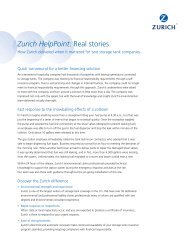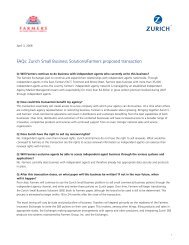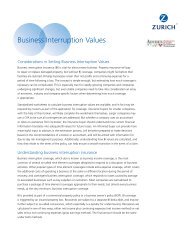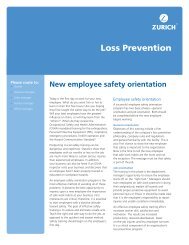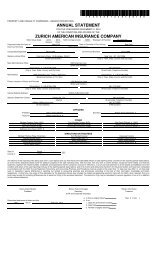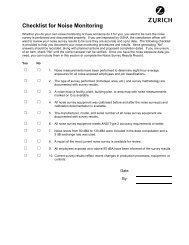Know the risks - Zurich
Know the risks - Zurich
Know the risks - Zurich
Create successful ePaper yourself
Turn your PDF publications into a flip-book with our unique Google optimized e-Paper software.
Insurance Corporation (FDIC) in two respects: (1) <strong>the</strong> FDIC was given broad authorityover federally insured banks and savings associations; and (2) <strong>the</strong> FDIC was givenpower to bring enforcement actions against any “institution-affiliated party,” which isdefined to include, among o<strong>the</strong>r things, any director, officer, employee or controllingstockholder (o<strong>the</strong>r than a holding company) of an insured depository institution.In addition to administrative remedies such as issuing cease and desist orders,suspension or removal from office, and prohibition orders, FIRREA empowers <strong>the</strong>FDIC to impose civil money penalties against institution-affiliated parties, includingindividuals who have left <strong>the</strong> institution, or individuals associated with institutionsthat are now closed. FIRREA sets forth three levels of civil money penalties that maybe imposed against an institution-affiliated party, ranging from less than $5,000to $1 million per day for continuing violations. Criminal penalties may range from$100,000 per day and one year’s imprisonment to $1 million per day and 20 years’imprisonment. These penalties also apply to violations of anti-tying provisions of <strong>the</strong>Bank Holding Company Act, <strong>the</strong> Change in Bank Control Act, affiliate transactionrestrictions, and <strong>the</strong> National Bank Act.Statutory and common laws governing <strong>the</strong> responsibilities of directors of financialinstitutions vary from state to state. Historically, a director’s acts or omissions weretested against an ordinary prudent person standard. However, at least 43 states haveenacted statutes permitting corporations to adopt charter provisions that limit oreliminate <strong>the</strong> liability of directors (and, in some states, officers) for breach of <strong>the</strong> dutyof care. FIRREA, however, limits <strong>the</strong> ability of depository institutions to eliminate adirector’s liability for gross negligence.“Functional regulation”The Gramm-Leach-Bliley Act of 1999 changed how depository institutions and <strong>the</strong>irholding companies and affiliates are regulated. The Gramm-Leach-Bliley Act promotes“functional regulation,” meaning that traditional depository institution activitiesare regulated by depository institution regulatory agencies, securities activities areregulated by <strong>the</strong> Securities and Exchange Commission (SEC), insurance activities areregulated by <strong>the</strong> states, and so on.Many depository institutions offer securities, mutual funds and o<strong>the</strong>r types ofinvestments to customers as alternatives to traditional deposit instruments. Customersmay misunderstand <strong>the</strong> nature of non-deposit products because <strong>the</strong> products are oftensold within <strong>the</strong> institution’s premises by <strong>the</strong> institution’s employees. In many instances,personnel are required to register as brokers (or dealers) with <strong>the</strong> SEC and NationalAssociation of Securities Dealers. Moreover, <strong>the</strong> products offered may be “securities”under federal or state securities laws which must be registered with <strong>the</strong> SEC and/orstate agencies. And, under <strong>the</strong> Gramm-Leach-Bliley Act, depository institutions that actas advisers to mutual funds must register with <strong>the</strong> SEC as “investment advisers” under<strong>the</strong> Investment Advisers Act of 1940. The Gramm-Leach-Bliley Act also contemplates<strong>the</strong> offering by depository institutions of “hybrid” products – products o<strong>the</strong>r thanequity swaps or a limited number of o<strong>the</strong>r products not previously regulated by <strong>the</strong>SEC as a security – and <strong>the</strong>se may be regulated ei<strong>the</strong>r by <strong>the</strong> SEC or by <strong>the</strong> FederalReserve Board, depending on <strong>the</strong> product in question.11Financial institutions guide



